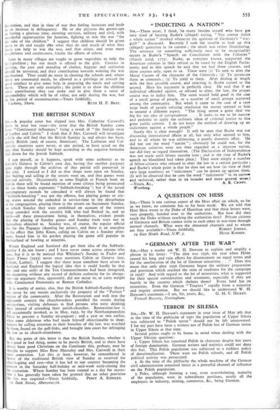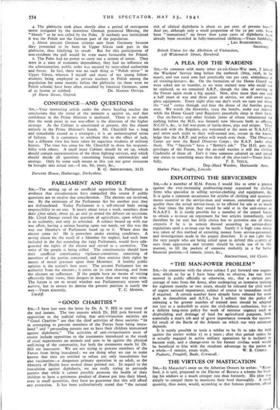TERROR IN SILESIA
SIR,—Dr. W. H. Dawson's statement in your issue of May 9th that at the time of the plebiscite of 1921 the population of Upper Silesia was subjected to "Polish terror" should not be left unanswered. I for my part have been a witness not of Polish but of German terror in Upper Silesia at that time.
Several points ought to be borne in mind when dealing with the Upper Silesian question: r. Upper Silesia has remained Polish in character despite 600 years of foreign domination. German writers and statistics could not deny this fact. This Polish population was subjected to a ruthless policy of denationalisation. There were no Polish schools, and all Polish political activity was persecuted. 2. At the time of the plebiscite the whole machine of the German civil administration remained intact as a powerful channel of influence on the Polish population.
3. Poles, although forming a vast, even overwhelming, majority of the population, were in subordinate positions, nearly all the employers in industry, mining, commerce, &c., being German. 4. The plebiscite took plape shortly after a period of outrageous terror instigated by the notorious German proconsul Horsing, the " bloody " as he was called by the Poles. If anybody was intimidated It was the Polish not the German part of the population.
5. About 200,000 German citizens sent from Germany because they pretended to be born in Upper Silesia took part in the plebiscite, thus falsifying its result. But for this participation of non-residents the poll would be even more favourable for Poland.
6. The Poles had no power to carry out a system of terror. They were in a state of economic dependency, they had no influence on the administration, public order was secured by inter-allied authorities and forces. In fact, there was no such thing as "Polish terror" in Upper Silesia, whereas I myself and many of my young fellow- students being employed as private teachers in Polish among the population for some months before the plebiscite (as there were no Polish schools) have been often assaulted by fanatical Germans, some































 Previous page
Previous page